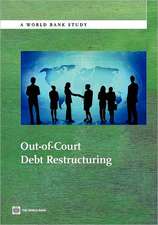Principled Persuasion in Employee Communication
Autor Mike Churchmanen Limba Engleză Paperback – 28 dec 2015
Preț: 385.54 lei
Nou
Puncte Express: 578
Preț estimativ în valută:
73.78€ • 76.75$ • 60.91£
73.78€ • 76.75$ • 60.91£
Carte tipărită la comandă
Livrare economică 15-29 aprilie
Preluare comenzi: 021 569.72.76
Specificații
ISBN-13: 9781472475060
ISBN-10: 1472475062
Pagini: 184
Dimensiuni: 156 x 234 x 13 mm
Greutate: 0.36 kg
Ediția:New ed
Editura: Taylor & Francis
Colecția Routledge
Locul publicării:Oxford, United Kingdom
ISBN-10: 1472475062
Pagini: 184
Dimensiuni: 156 x 234 x 13 mm
Greutate: 0.36 kg
Ediția:New ed
Editura: Taylor & Francis
Colecția Routledge
Locul publicării:Oxford, United Kingdom
Public țintă
Professional Practice & DevelopmentNotă biografică
Mike Churchman has spent over 40 years as a practitioner of persuasive communication, for nearly half that time in top London advertising agencies, and then as partner in his own consultancy specialising in internal communication. He’s an Oxford graduate in English Language and Literature and was elected Fellow of the Institute of Practitioners in Advertising in 1989 and Fellow of the Institute of Directors in 1994.
Recenzii
’I’ve consulted with many large household name enterprises over the years and seen both highly effective and ineffective styles of internal communication. This deep and erudite book sets out to persuade you to rethink the old approaches and communicate creatively with employees, so they can better contribute to common goals. I strongly recommend all senior executives to read this book!’ Graham Tomkinson, CEO Performance Brunel; formerly COO of IBM’s European Management Consulting Division ’Wonderfully disturbing and inspiringly constructive, Principled Persuasion is both a critique of current practice in organisational communications and a vision of its possibilities. Informed by history, philosophy, psychology, ethics, science and technology, Mike Churchman offers a provocative and compelling argument for why the price of engineered, top-down communication is no longer worth paying and needs to give way to more dynamic, progressive and collaborative patterns. Principled Persuasion is a manifesto for the long-awaited revolution which could see organisations finally combine both productivity and humanity.’ Alan Robertson, Director, Business Cognition Ltd ’This is an interesting analysis of developments in the way that organisations are managed and the impact on internal communication. It presents a well-argued case, steeped in references to psychology, for a new open, truthful and ethical approach to internal communication and a good life at work. An excellent guide to help internal communication practitioners and operational managers make organisations a more meaningful place for people to work.’ Kevin Ruck, Co-founder, The PR Academy
Cuprins
Introduction. Part I A Continuing Journey Chapter 1: Pathways from the past: the evolution of employee communication; Chapter 2: Pathways to the future: five converging forces shaping the future of work; Part II Signposts for the Road Ahead Chapter 3: Changing minds: the basic principles of principled persuasion; Chapter 4: Happiness at work: the principles of hedonic persuasion; Chapter 5: Harm at work: the principles of mindful persuasion; Chapter 6: The good life at work: the principles of ethical persuasion; Part III Making Conversation along the Way Chapter 7: Watch your language: the principles of meaningful persuasion; Chapter 8: Say it with feeling: the principles of rhetorical persuasion; Chapter 9: Tell the truth: the principles of truthful persuasion; Part IV Next Steps Chapter 10: Make the right moves: practical steps towards a progressive organisation nurtured by principled persuasion.
Descriere
Principled Persuasion in Employee Communication highlights a new but significant dilemma for organisational leaders. Will they continue on the same track that, since the nineteenth century, has led them to exert increasing control over their employees? Or will they take another path, one that leads towards a new type of working environment where the culture encourages freedom of communication and movement? This book argues for an approach to employee communication that sets out to liberate employees from the stifling constraints that organisations continue to impose on them.






